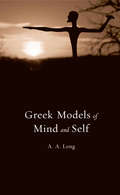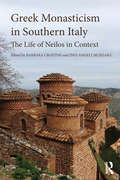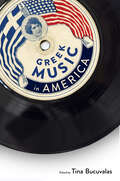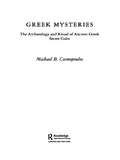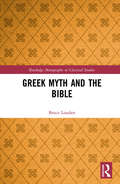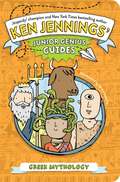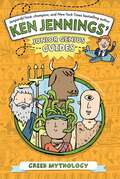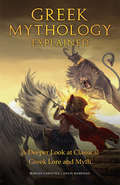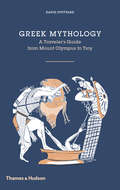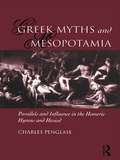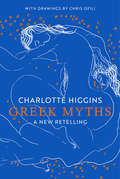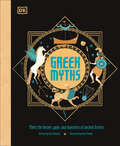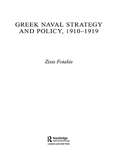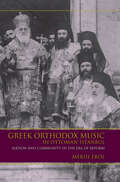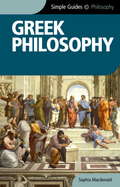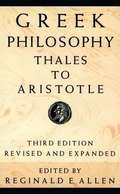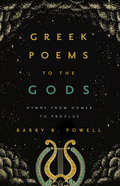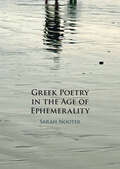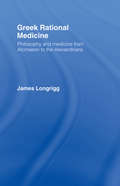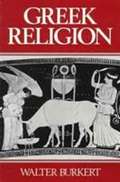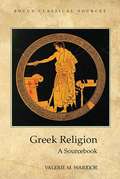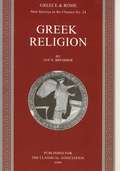- Table View
- List View
Greek Models of Mind and Self
by A. A. LongAn authoritative treatment of Greek modes of self-understanding, Greek Models of Mind and Self demonstrates how ancient thinkers grappled with what is closest to us and yet still most mysterious―our own essence as singular human selves―and how the study of Greek thought can enlarge and enrich our experience.
Greek Models of Mind and Self
by Anthony A. LongThis lively book offers a wide-ranging study of Greek notions of mind and human selfhood from Homer through Plotinus. A. A. Long anchors his discussion in questions of recurrent and universal interest. What happens to us when we die? How is the mind or soul related to the body? Are we responsible for our own happiness? Can we achieve autonomy? Long asks when and how these questions emerged in ancient Greece, and shows that Greek thinkers’ modeling of the mind gave us metaphors that we still live by, such as the rule of reason or enslavement to passion. He also interrogates the less familiar Greek notion of the intellect’s divinity, and asks what that might mean for us.<P><P> Because Plato’s dialogues articulate these themes more sharply and influentially than works by any other Greek thinker, Plato receives the most sustained treatment in this account. But at the same time, Long asks whether Plato’s explanation of the mind and human behavior is more convincing for modern readers than that contained in the older Homeric poems. Turning to later ancient philosophy, especially Stoicism, Long concludes with an exploration of Epictetus’s injunction to live life by making correct use of one’s mental impressions.<P> An authoritative treatment of Greek modes of self-understanding, Greek Models of Mind and Self demonstrates how ancient thinkers grappled with what is closest to us and yet still most mysterious―our own essence as singular human selves―and how the study of Greek thought can enlarge and enrich our experience.
Greek Monasticism in Southern Italy: The Life of Neilos in Context
by Barbara Crostini Ines Angeli MurzakuThis volume was conceived with the double aim of providing a background and a further context for the new Dumbarton Oaks English translation of the Life of St Neilos from Rossano, founder of the monastery of Grottaferrata near Rome in 1004. Reflecting this double aim, the volume is divided into two parts. Part I, entitled “Italo-Greek Monasticism,” builds the background to the Life of Neilos by taking several multi-disciplinary approaches to the geographical area, history and literature of the region denoted as Southern Italy. Part II, entitled “The Life of St Neilos,” offers close analyses of the text of Neilos’s hagiography from socio-historical, textual, and contextual perspectives. Together, the two parts provide a solid introduction and offer in-depth studies with original outcomes and wide-ranging bibliographies. Using monasticism as a connecting thread between the various zones and St Neilos as the figure who walked over mountains and across many cultural divides, the essays in this volume span all regions and localities and try to trace thematic arcs between individual testimonies. They highlight the multicultural context in which Southern Italian Christians lived and their way of negotiating differences with Arab and Jewish neighbors through a variety of sources, and especially in saints’ lives.
Greek Music in America (American Made Music Series)
by Tina BucuvalasWinner of the 2019 Vasiliki Karagiannaki Prize for the Best Edited Volume in Modern Greek StudiesContributions by Tina Bucuvalas, Anna Caraveli, Aydin Chaloupka, Sotirios (Sam) Chianis, Frank Desby, Stavros K. Frangos, Stathis Gauntlett, Joseph G. Graziosi, Gail Holst-Warhaft, Michael G. Kaloyanides, Panayotis League, Roderick Conway Morris, National Endowment for the Arts/National Heritage Fellows, Nick Pappas, Meletios Pouliopoulos, Anthony Shay, David Soffa, Dick Spottswood, Jim Stoynoff, and Anna Lomax Wood Despite a substantial artistic legacy, there has never been a book devoted to Greek music in America until now. Those seeking to learn about this vibrant and exciting music were forced to seek out individual essays, often published in obscure or ephemeral sources. This volume provides a singular platform for understanding the scope, practice, and development of Greek music in America through essays and profiles written by principal scholars in the field. Greece developed a rich variety of traditional, popular, and art music that diasporic Greeks brought with them to America. In Greek American communities, music was and continues to be an essential component of most social activities. Music links the past to the present, the distant to the near, and bonds the community with an embrace of memories and narrative. From 1896 to 1942, more than a thousand Greek recordings in many genres were made in the United States, and thousands more have appeared since then. These encompass not only Greek traditional music from all regions, but also emerging urban genres, stylistic changes, and new songs of social commentary. Greek Music in America includes essays on all of these topics as well as history and genre, places and venues, the recording business, and profiles of individual musicians. This book is required reading for anyone who cares about Greek music in America, whether scholar, fan, or performer.
Greek Mysteries: The Archaeology of Ancient Greek Secret Cults
by Michael B. CosmopoulosWritten by an international team of acknowledged experts, this excellent book studies a wide range of contributions and showcases new research on the archaeology, ritual and history of Greek mystery cults. With a lack of written evidence that exists for the mysteries, archaeology has proved central to explaining their significance and this volume is key to understanding a phenomenon central to Greek religion and society.
Greek Myth and the Bible (Routledge Monographs in Classical Studies)
by Bruce LoudenSince the nineteenth-century rediscovery of the Gilgamesh epic, we have known that the Bible imports narratives from outside of Israelite culture, refiguring them for its own audience. Only more recently, however, has come the realization that Greek culture is also a prominent source of biblical narratives. Greek Myth and the Bible argues that classical mythological literature and the biblical texts were composed in a dialogic relationship. Louden examines a variety of Greek myths from a range of sources, analyzing parallels between biblical episodes and Hesiod, Euripides, Argonautic myth, selections from Ovid’s Metamorphoses, and Homeric epic. This fascinating volume offers a starting point for debate and discussion of these cultural and literary exchanges and adaptations in the wider Mediterranean world and will be an invaluable resource to students of the Hebrew Bible and the influence of Greek myth.
Greek Mythology (Ken Jennings’ Junior Genius Guides)
by Ken JenningsUnleash your inner genius and become a master of mythology with this interactive trivia book from Jeopardy! champ and New York Times bestselling author Ken Jennings.With this Junior Genius Guide to Greek mythology, you’ll become an expert and wow your friends and teachers with all the best ancient stories: how Prometheus outsmarted the gods, how Achilles’s heel led to his death, and how we mere mortals always seem to get mixed up in so many misadventures. With great illustrations, cool trivia, and fun quizzes to test your knowledge, this guide will have you on your way to whiz-kid status in no time!
Greek Mythology (Ken Jennings’ Junior Genius Guides)
by Ken JenningsUnleash your inner genius and become a master of mythology with this interactive trivia book from Jeopardy! host and champion and New York Times bestselling author Ken Jennings.With this Junior Genius Guide to Greek mythology, you&’ll become an expert and wow your friends and teachers with all the best ancient stories: how Prometheus outsmarted the gods, how Achilles&’s heel led to his death, and that most of our eighty-eight constellations are based on what Greeks and Romans imagined thousands of years ago! With great illustrations, cool trivia, and fun quizzes to test your knowledge, this guide will have you on your way to whiz-kid status in no time!
Greek Mythology Explained: A Deeper Look at Classical Greek Lore and Myth
by Marios Christou David RamenahA unique retelling of Greek mythological tales featuring love, betrayal, murder and ruthless ambitions—for fans of George R. R. Martin’s Game of Thrones.Discover six classic Greek myths in this exciting retelling that paints both famous and lesser-known characters in a whole new light. Follow the likes of Odysseus, Lamia, Bellerophon, Icarus, Medusa and Artemis as their fates are revealed through bloody trials, gut-wrenching betrayals, sinister motives and broken hearts. With an accessible writing style that delves into the thoughts, feelings, desires, and motivations of every character, these mythical figures and their compelling stories will resonate with readers as they are guided through perilous and tragic adventures.Greek Mythology Explained provides an in-depth analysis of each story told as it unravels the greater themes and valuable lessons hidden within each chapter. Inside these pages, you’ll . . .Sail with Odysseus as he navigates through the straits of Messina with a terrifying monster on each side, intent only on killing him and his crew.Witness Lamia’s world turned upside down as she loses her kingdom, her children and her humanity.Journey with Bellerophon as he battles the Chimera and becomes the hero that he was destined to be.Take flight with Icarus and Daedalus as they escape their confinement and the Cretan navy.Follow Medusa as she loses faith in the gods and becomes the monster she so adamantly wished to protect her people from.Experience the love between Artemis and Orion, as well as the bitter jealousy it spawns at the core of her brother Apollo.
Greek Mythology: A Traveler's Guide
by David StuttardA hands-on traveler's guide to the enthralling tales of Greek mythology, organized around the cities and landscapes where the events are set The Greek myths have a universal appeal, beyond the time and physical place in which they were created. But many are firmly rooted in specific landscapes: the city of Thebes and mountain range Cithaeron dominate the tale of Oedipus; the city of Mycenae broods over the fates of Agamemnon and Electra; while Knossos boasts the scene of Theseus' slaying of the Minotaur. Drawing on a wide range of classical sources, newly translated by the author, and illustrated with specially commissioned drawings, this book is both a useful read for those visiting the sites and a fascinating imaginative journey for the armchair traveler. The itinerary includes twenty-two locations, from Mount Olympus to Homer's Hades, recounting the myths and history associated with each site and highlighting features that visitors can still see today. Scholarly text, supported by quotes from primary sources and contemporary research, as well as the enticing stories of gods and goddesses, heroes and villains, enrich the reader's literal or simply literary experience of these sites, whose significance still resonates today.
Greek Myths and Mesopotamia: Parallels and Influence in the Homeric Hymns and Hesiod
by Charles PenglaseThe Mesopotamian influence on Greek mythology in literary works of the epic period is considerable - yet it is a largely unexplored field. In this book Charles Penglase investigates major Mesopotamian and Greek myths. His examination concentrates on journey myths. A major breakthrough is achieved in the recognition of the extent of Mesopotamian influence and in the understanding of the colourful myths involved.The results are of significant interest, especially to scholars and students of ancient Greek and Near Eastern religion and mythology.
Greek Myths: A New Retelling
by Charlotte HigginsA brilliantly original, landmark retelling of Greek myths, recounted as if they were actual scenes being woven into textiles by the women who feature prominently in them—including Athena, Helen, Circe and Penelope&“Greek myths were full of powerful witches, unpredictable gods and sword-wielding slayers. They were also extreme: about families who turn murderously on each other; impossible tasks set by cruel kings; love that goes wrong; wars and journeys and terrible loss. There was magic, there was shape-shifting, there were monsters, there were descents to the land of the dead. Humans and immortals inhabited the same world, which was sometimes perilous, sometimes exciting. &“The stories were obviously fantastical. All the same, brothers really do war with each other. People tell the truth but aren&’t believed. Wars destroy the innocent. Lovers are parted. Parents endure the grief of losing children. Women suffer violence at the hands of men. The cleverest of people can be blind to what is really going on. The law of the land can contradict what you know to be just. Mysterious diseases devastate cities. Floods and fire tear lives apart. &“For the Greeks, the word muthos simply meant a traditional tale. In the twenty-first century, we have long left behind the political and religious framework in which these stories first circulated—but their power endures. Greek myths remain true for us because they excavate the very extremes of human experience: sudden, inexplicable catastrophe; radical reversals of fortune; and seemingly arbitrary events that transform lives. They deal, in short, in the hard, basic facts of the human condition.&” —from the Introduction
Greek Myths: Meet the heroes, gods, and monsters of ancient Greece (Ancient Myths)
by DK Jean MenziesA beautifully-illustrated book filled with over 30 Ancient Greek Myths for children aged 7-9.Journey into a world of gods and goddesses, heroes and heroines, extraordinary creatures and fantastic monsters with this beautifully illustrated introduction to Ancient Greek mythology. Perfect for children aged 7 to 9, this collection contains more than 30 enthralling new retellings of favourite Greek myths as well as some you might not have heard before.Including &‘Theseus and the Minotaur&’, &‘The 12 Labours of Herakles&’, and the escapades of &‘Jason and the Argonauts&’, each myth is told in engaging modern language, which is easy for children to understand yet still retains the humour and intrigue of the original tales. Encourage your children to explore: - Over 30 fascinating Greek myths, covering famous classics and lesser known stories- Striking illustrations by multi-award winning artist Katie Ponder- Stunning gold foil on the cover - A handy pronunciation guide listing all difficult-to-pronounce names for the reader&’s convenience- Key reference spreads combining the appeal of a story collection with key reference informationA must-have volume for children aged 7-9 with an interest in Greek mythology and history, the additional feature pages delve deeper into the mythical world, providing profiles of the gods and a map detailing Odysseus&’ long voyage home from the Trojan War. The reference section provides key background information, such as Ancient Greek storytelling and the incredible beasts of the myths, and a handy pronunciation guide. Greek Myths is the perfect gift, featuring stunning gold foil on the cover and beautiful illustrations throughout. Quench your child&’s curiosity and thirst for knowledge, as they explore the enthralling tales, whether by themselves or to equally be enjoyed as bedtime stories alongside parents.
Greek Narratives of the Roman Empire under the Severans
by Adam M. KemezisThe political instability of the Severan Period (AD 193-235) destroyed the High Imperial consensus about the Roman past and caused both rulers and subjects constantly to re-imagine and re-narrate both recent events and the larger shape of Greco-Roman history and cultural identity. This book examines the narratives put out by the new dynasty, and how the literary elite responded with divergent visions of their own. It focuses on four long Greek narrative texts from the period (by Cassius Dio, Philostratus and Herodian), each of which constructs its own version of the empire, each defined by different Greek and Roman elements and each differently affected by dynastic change, especially that from Antonine to Severan. Innovative theories of narrative are used to produce new readings of these works that bring political, literary and cultural perspectives together in a unified presentation of the Severan era as a distinctive historical moment.
Greek Naval Strategy and Policy 1910-1919 (Cass Series: Naval Policy And History Ser.)
by Zisis FotakisA sharp analysis of Greek naval history in the 1910s, a time when the importance of its geographic position and its navy increased greatly. It explains the causes of these developments and their consequences for Greek national aims, the Mediterranean naval situation and the Balkan balance of power. Within this context,
Greek Orthodox Music in Ottoman Istanbul: Nation and Community in the Era of Reform (Ethnomusicology Multimedia)
by Merih ErolA study of the musical discourse among Ottoman Greek Orthodox Christians during a complicated time for them in the nineteenth and early twentieth centuries.During the late Ottoman period (1856–1922), a time of contestation about imperial policy toward minority groups, music helped the Ottoman Greeks in Istanbul define themselves as a distinct cultural group. A part of the largest non-Muslim minority within a multi-ethnic and multi-religious empire, the Greek Orthodox educated elite engaged in heated discussions about their cultural identity, Byzantine heritage, and prospects for the future, at the heart of which were debates about the place of traditional liturgical music in a community that was confronting modernity and westernization. Merih Erol draws on archival evidence from ecclesiastical and lay sources dealing with understandings of Byzantine music and history, forms of religious chanting, the life stories of individual cantors, and other popular and scholarly sources of the period. Audio examples keyed to the text are available online.“Merih Erol’s careful examination of the prominent church cantors of this period, their opinions on Byzantine, Ottoman and European musics as well as their relationship with both the Patriarchate and wealthy Greeks of Istanbul presents a detailed picture of a community trying to define their national identity during a transition. . . . Her study is unique and detailed, and her call to pluralism is timely.” —Mehmet Ali Sanlikol, author of The Musician Mehters“Overall, the book impresses me as a sophisticated work that avoids the standard nationalist views on the history of the Ottoman Greeks.” —Risto Pekka Pennanen, University of Tampere, Finland“This book is a great contribution to the fields of historical ethnomusicology, religious studies, ethnic studies, and Ottoman and Greek studies. It offers timely research during a critical period for ethnic minorities in the Middle East in general and Christians in particular as they undergo persecution and forced migration.” —Journal of the American Academy of Religion
Greek Philosophy - Simple Guides
by Sophia MacdonaldTHIS BOOK WILL HELP YOU* to appreciate the revolution in thinking brought about by the Ancient Greek philosophers, who sought to make sense of the world through analysis, reasoning and argument* to recognize the key ideas of the most significant philosophers and their contribution to Western thought* to learn about the philosophers' lives, and their impact on society* to appreciate the value of questioning received wisdom and submitting it to rigorous analysisTo live in the modern world is to owe a debt of gratitude to the Ancient Greeks. Ancient Greece was one of the wellsprings of European civilization, and the Greeks were both the pioneers of rigorous analytical thought and the creators of prose and poetry that speak to us over the centuries.Materialism and idealism form the two major strands of Greek philosophy: thinking about the universe, nature and matter; and thinking about humanity, politics, justice, good and evil, and our relationship with the divine. The Greeks were the first to distinguish between myth and philosophy, and to develop a scientific method of enquiry. In ancient Greece 'natural philosophers' studied mathematics, physics, logic, cosmology, medicine, Politics, ethics and aesthetics. Democracy, atoms, copycat killings -- the Greeks had opinions on these and many more, and their conclusions have often proved prescient. Cynicism and Stoicism are Greek philosophical schools whose names have passed into common parlance.This lucid introduction to Greek philosophy links important ideas to key personalities and places. It shows the development and movement of people and ideas around the Mediterranean world, from the time of the earliest pre Socratic philosophers, through Pythagoras, Heraclitus, and the Sophists to Socrates, Plato, Aristotle, the Cynics and the Stoics. Written in a clear and engaging style, it is a fascinating account of the major source of Western culture and today's knowledge-based society.ACCESS THE WORLD'S PHILOSOPHIESSimple Guides: Philosophy is a series of concise introductions to the major philosophies of the world. Written by experts in the field, these accessible guides offer a fascinating account of the rich variety of arguments ideas and systems of thought articulated by different cultures in the attempt to explore and define the nature of reality, and the meaning, purpose and proper conduct of life.The Simple Guides will appeal to analytical thinkers and spiritual seekers alike. Taken together, they provide a basic introduction to the evolution of human thought, and a point of reference for further exploration and discovery. By offering essential insights into the world views of different societies, they also enable travellers to behave in a way that fosters mutual respect and understanding.
Greek Philosophy: Thales to Aristotle (Third Edition)
by Reginald E. AllenEvery history of philosophy begins with Thales, and records with proper solemnity his opinion that the source of all things is water. And every beginning student is shocked. Not until he reaches Plato and Aristotle does he find himself in a world recognizably his own, a world whose science, law, and logic are of a type his own experience has made familiar. The pronouncements of philosophers are usually answers to questions, whether or not the questions are explicitly put. If Thales claimed that the source of all things is water, his question must presumably have been, What is the source of all things?
Greek Poems to the Gods: Hymns from Homer to Proclus
by Barry B. PowellThe ancient Greek hymnic tradition translated beautifully and accessibly. The hymn—as poetry, as craft, as a tool for worship and philosophy—was a vital art form throughout antiquity. Although the Homeric Hymns have long been popular, other equally important collections have not been readily accessible to students eager to learn about ancient poetry. In reading hymns, we also gain valuable insight into life in the classical world. In this collection, early Homeric Hymns of uncertain authorship appear along with the carefully wrought hymns of the great Hellenistic poet and courtier Callimachus; the mystical writings attributed to the legendary poet Orpheus, written as Christianity was taking over the ancient world; and finally, the hymns of Proclus, the last great pagan philosopher of antiquity, from the fifth century AD, whose intellectual influence throughout western culture has been profound.Greek Poems to the Gods distills over a thousand years of the ancient Greek hymnic tradition into a single volume. Acclaimed translator Barry B. Powell brings these fabulous texts to life in English, hewing closely to the poetic beauty of the original Greek. His superb introductions and notes give readers essential context, making the hymns as accessible to a beginner approaching them for the first time as to an advanced student continuing to explore their secrets. Brilliant illustrations from ancient art enliven and enrichen the experience of reading these poems.
Greek Poetry in the Age of Ephemerality
by Sarah NooterThis book suggests that poetry offers a way to remain in the world – not only by declarations of intent or the promotion of remembrance, but also through the durable physicality of its practice. Whether carved in stone or wood, printed onto a page, beat out by a mimetic or rhythmic body, or humming in the mind, poems are meant to engrave and adhere. Ancient Greek poetry exhibits a particularly acute awareness of change, decay, and the ephemerality inherent in mortality. Yet it couples its presentation of this awareness with an offering of meaningful embodiment in shifting forms that are aligned with, yet subtly manipulative of, mortal time. Sarah Nooter's argument ranges widely across authors and genres, from Homer and the Homeric Hymns through Sappho and Archilochus to Pindar and Aeschylus. The book will be compelling reading for all those interested in Greek literature and in poetry more broadly.
Greek Popular Morality in the Time of Plato and Aristotle
by K. J. DoverA book useful in understanding events of the time, such as the death of Socrates.
Greek Rational Medicine: Philosophy and Medicine from Alcmaeon to the Alexandrians
by James LongriggThe ancient Greek medical thinkers were profoundly influenced by Ionian natural philosophy. This philosophy caused them to adopt a radically new attitude towards disease and healing. James Longrigg shows how their rational attitudes ultimately resulted in levels of sophistication largely unsurpassed until the Renaissance. He examines the important relationship between philosophy and medicine in ancient Greece and beyond, and reveals its significance for contemporary western practice and theory.
Greek Religion
by Walter Burkert John RaffanIn this book Walter Burkert, the most eminent living historian of ancient Greek religion, has produced the standard work for our time on that subject. First published in German in 1977, it has now been translated into English with the assistance of the author himself. A clearly structured and readable survey for students and scholars, it will be welcomed as the best modern account of any polytheistic religious system. Burkert draws on archaeological discoveries, insights from other disciplines, and inscriptions in Linear B to reconstruct the practices and beliefs of the Minoanâe"Mycenaean age. The major part of his book is devoted to the archaic and classical epochs. He describes the various rituals of sacrifice and libation and explains Greek beliefs about purification. He investigates the inspiration behind the great temples at Olympia, Delphi, Delos, and the Acropolisâe"discussing the priesthood, sanctuary, and oracles. Considerable attention is given to the individual gods, the position of the heroes, and beliefs about the afterlife. The different festivals are used to illuminate the place of religion in the society of the city-state. The mystery cults, at Eleusis and among the followers of Bacchus and Orpheus, are also set in that context. The book concludes with an assessment of the great classical philosophersâe(tm) attitudes to religion. Insofar as possible, Burkert lets the evidenceâe"from literature and legend, vase paintings and archaeologyâe"speak for itself; he elucidates the controversies surrounding its interpretation without glossing over the enigmas that remain. Throughout, the notes (updated for the English-language edition) afford a wealth of further references as the text builds up its coherent picture of what is known of the religion of ancient Greece.
Greek Religion (Focus Classical Sources)
by Valerie M. WarriorGreek Religion: A Sourcebook provides an introduction to the fundamentals of ancient Greek religious beliefs and rituals through a rich collection of ancient source readings. The translations draw from the Focus Classical Library sources as well as new translations by the author and other outstanding scholars. Chapters cover such topics as ancient magic, mystery cults, divination, and festivals. Illustrated throughout with photos and maps, this book is designed as a companion to Valerie Warrior’s Roman Religion: A Sourcebook.
Greek Religion (New Surveys In The Classics #24)
by Jan N. BremmerIn this brief but highly informative book Jan Bremmer presents an outline of Greek religion in the classical period. After a survey of its main characteristics, he offers a clear and innovative view of the great gods and heroes as well as their sanctuaries and also the main myths, rituals and mysteries: from Athena to Zeus, from sacrifice to the puritan Orphics, from the Indo-European roots to the influence of the ancient Near East. The approach pays attention to the sociological, anthropological and psychological aspects of Greek religion and also to the gender roles. By analyzing the often modern origin of many of the notions employed in the analysis of Greek religion, it also shows the difference between the polytheism of the Greeks and the place of religion in modern Western society. Its excellent bibliography makes this book a very useful tool for students and teachers alike.
